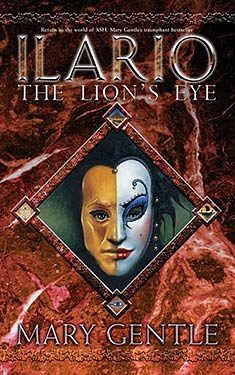Mary Gentle
Completed 8/8/2018, Reviewed 8/9/2018
2 stars
I really struggled with this book. It took me eight days to read a 322 page book,
which is a long time for me. I didn’t care
for the plot, and many times, it devolved into soapiness. It’s a shame because I would think there’d be
so much you could do with a story about a true hermaphrodite during the Renaissance. This is the first of a two-part series. It ends in a cliffhanger, but I don’t feel
any compulsion to read the second part.
 The story is about Ilario, someone with fully functional genitalia
of both sexes. Ilario can pass as a man
or a woman, depending on how they dress.
(I’ll use the third person plural pronouns for Ilario). They lived in a kingdom on the Iberian
Peninsula where they were the King’s freak, after being raised by foster
parents. After nearly being killed by
their birth mother, they leave for Carthage.
There, they’re kidnapped and sold into slavery, but their master,
Rekhmire’ is a gentle Egyptian eunuch who purchases him for scroll
copying. In addition, he lets them
pursue their love of painting, even going to Rome so that they can study under
a master of a new style of art. However,
they are being chased by assassins hired by Ilario’s birth mother and step-father,
who is the first minister of the court of the King, because they’re embarrassed
to be related to a hermaphrodite.
The story is about Ilario, someone with fully functional genitalia
of both sexes. Ilario can pass as a man
or a woman, depending on how they dress.
(I’ll use the third person plural pronouns for Ilario). They lived in a kingdom on the Iberian
Peninsula where they were the King’s freak, after being raised by foster
parents. After nearly being killed by
their birth mother, they leave for Carthage.
There, they’re kidnapped and sold into slavery, but their master,
Rekhmire’ is a gentle Egyptian eunuch who purchases him for scroll
copying. In addition, he lets them
pursue their love of painting, even going to Rome so that they can study under
a master of a new style of art. However,
they are being chased by assassins hired by Ilario’s birth mother and step-father,
who is the first minister of the court of the King, because they’re embarrassed
to be related to a hermaphrodite.
The book is told in first person, but I didn’t feel like I
really got inside Ilario’s head. As
characters go, I found Rekhmire’ to be quite likeable. He was a compassionate person and treated
Ilario well. I also really liked
Honorius, Ilario’s birth father. Both
men were very accepting of Ilario and embraced them with a deep love and
respect. However, there’s one scene that
went on and on that I didn’t care for. It
was a discussion between Ilario, Rekhmire’, and Honorius which was basically an
exposition that recounts the story of Ilario growing up and being hated by their
step-father and birth mother, and the plot to kill Ilario. It was simply painful to read and I felt it
could have been told much cleanly and concisely. I think that was the point where I realized
the book wasn’t written well and that set the tone for my inability to get too
far into the book each day.
I was really disappointed in the world building as
well. Considering the stories locales
include Carthage, Rome, and Venice, I didn’t get the feeling that I was in any
of those places. Carthage was
interesting in that it was covered by a darkness called The Penitence. But the only thing that I really got out of
it was that there was a specific kind of lamp in use all over the city, and the
author referred to those lamps at every opportunity. Rome had its ruins and Venice had its canals,
but the author just didn’t do much with them.
I give this book two stars out of five. I was really looking forward to this book
because of its intersex main character, but the execution of the book made it a
disappointment. This is surprising because
the author won a British Science Fiction Award for Best Novel for another book,
“Ash”. However, I’m less likely to read
that one because of my experience with “Ilario”.
No comments:
Post a Comment